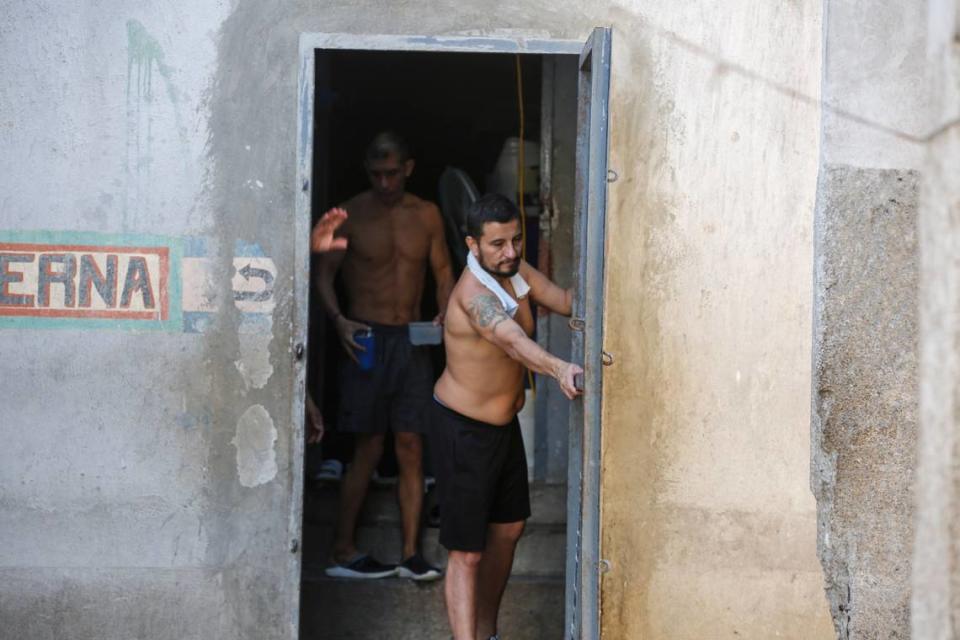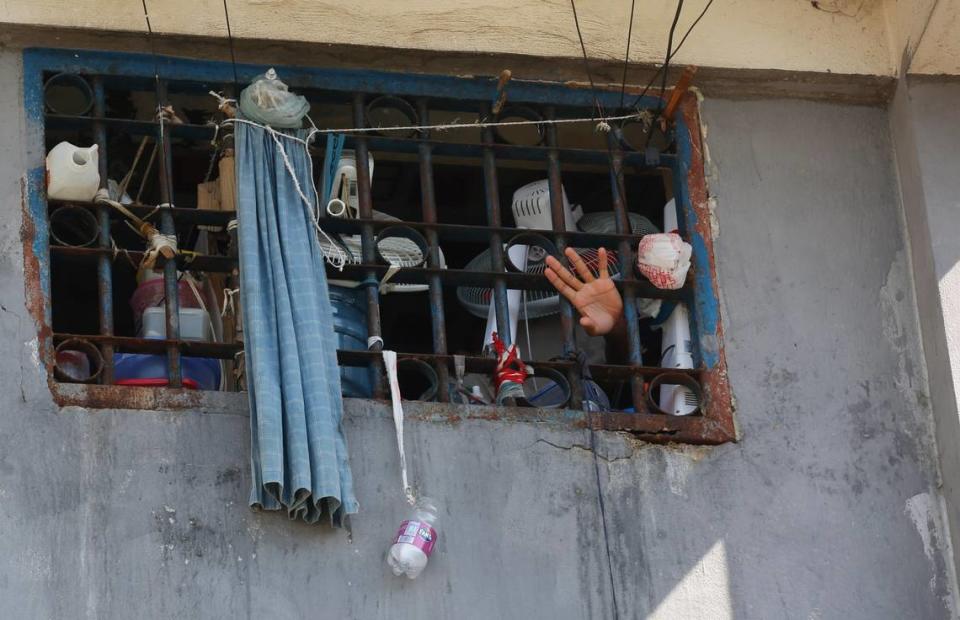White House sounds alarm that Haiti is ‘rapidly deteriorating’ as gangs move on key targets
The Biden administration is alarmed over what it is describing as a “rapidly deteriorating security situation” in Haiti as the country’s armed gangs broadened their attacks on critical infrastructure Sunday, launching an assault against the police academy after storming two prisons in the capital and the port the night before.
The gangs have already seized control of several police substations and are threatening to take over the presidential palace — a dramatic escalation in violence in what has already been a dire security environment that has paralyzed the Caribbean nation ever since the assassination of its president in 2021.
Late Sunday, Haiti finance minister and Acting Prime Minister Michel Patrick Boisvert declared a 6 p.m.-to-5 a.m. curfew and a state of emergency for the next 72 hours so security forces can try to regain control of the situation. Both allow police to arrest offenders throughout the entire regional department that includes metropolitan Port-au-Prince. The civil unrest also prompted an urgent security alert to U.S. citizens from the State Department on Sunday and led to American Airlines suspending its daily flight out of Miami International Airport into Port-au-Prince, spokeswoman Laura Masvidal confirmed to the Miami Herald. The airline is also suspending its daily flight for Monday.
JetBlue Airways, which has daily service into Port-au-Prince from both Fort Lauderdale-Hollywood International Airport and John F. Kennedy International Airport in New York, also canceled flights for Monday, spokesman Derek Dombrowski said.
“We are monitoring the rapidly deteriorating security situation with grave concern,” a National Security Council official told McClatchy and the Herald on Sunday evening. “The path forward lies with free and fair elections. Violence serves only to delay a democratic transition while destroying and upending the lives of thousands. We urge all actors to put the people of Haiti first and make the necessary concessions to allow for inclusive governance, elections, and the restoration of democracy.”
In the security alert to U.S. citizens, the U.S. Embassy in Port-au-Prince, which had been advising Americans “to exercise extreme caution,” said it would be limiting operations on Monday.
U.S. citizens “should depart Haiti as soon as possible by commercial or other privately available transportation options, in light of the current security situation and infrastructure challenges,” the alert read. All appointments over the next three days will be canceled, which means that people should not attempt to go to the embassy because conditions may not be admitted, the embassy added.
The escalation in violence, accompanied by intense automatic gunfire across Port-au-Prince, is raising concerns that the government is losing control of the country. On Saturday, armed gangs, using drone technology, seized control of the National Penitentiary and orchestrated the escape of hundreds of prisoners, including several notorious gang chiefs. Gangs also attacked and emptied the Croix-des-Bouquets prison, disrupted cell phone communication in parts of the capital by cutting fiber lines and cut the power to the port after sabotaging a 5 megawatt power plant days earlier. Gangs also threatened to take over the National Palace.
After launching an SOS the night before in response to the prison break, one of the police unions, SYNAPOHA, launched another call for help Sunday afternoon. The base of the specialized Crowd Control and Intervention Unit was under “a big threat,” the union said, reporting that men had encircled the base by blocking parts of the Delmas neighborhood in order to attack the base.
“The police must not take these threats lightly,” the union said on X, formerly Twitter.
The Haitian government said the attacks against the country’s two largest prisons caused deaths and injuries among prison guards. There were still no details, however,about the extent of the attacks, which sources say have decimated an already weak police force. The government’s communication office, in a late afternoon social media post, confirmed the release of “many prisoners.” Saluting the courage of officers who tried to stop the prison attacks, the office said that with the complicity of some people, criminal gangs “did not hesitate to kill civilians, loot and burn public and private property. Unfortunately, the police did not mange to prevent the bandits from releasing many prisoners.”
The Haiti National Police was trying to locate the escaped prisoners and arrest those responsible for prison attacks, the government said.
The latest armed clashes come while Haitian Prime Minister Ariel Henry is out of the country and just days after Caribbean Community leaders last week announced that he had committed to hold elections by August 2025. The next day, Henry, while visiting Kenya, finalized a police-and security-sharing agreement to allow for the deployment of an armed international force in Haiti.
Observers believe both developments may have fueled the latest round of violence in which the gangs are showing that they are not only united, but have the ability to take over the government. On Saturday night before moving against the two prisons, gangs cut the electricity at the port in order to disrupt the movement of refrigerated containers. Gunfire forced a number of anchored ships to leave Haitian waters, a source told the Herald. There were also reports that gunshots were heard near the international airport.
After the port, the armed groups moved onto the National Penitentiary, where on Sunday morning several bodies were seen lying on the ground as journalists visited the once overcrowded facility that was now nearly empty.
It remains unclear just how many prisoners escaped during the sophisticated prison attack at the National Penitentiary, in which the gangs used drone technology to report on the movement of prison guards and when their members could move against the facility. But among those still left inside were 17 former Colombian soldiers recently indicted in the assassination of Haiti’s president.

Retired Lt. Jheyner Alberto Carmona Flórez who called his wife, Milena Carmona, around 9 a.m. from the capital, said he and his compatriots were fine for now despite efforts to have them leave during the prison break. He said a police officer had arrived and told them they needed to contact their families.
“They are currently waiting inside, but there is a lot of uncertainty because they are the only people inside the prison, otherwise there is no one in that prison. The doors are open, with police there, but they are the only detainees who are there,” Milena Carmona told the Herald from Colombia. “It is empty because everyone fled.”
Her husband, she said, told her that there was an attempt “to beat them up last night.”
“They tried to hurt them. They didn’t allow that. They resisted,” Carmona said. “We are distressed because we are very afraid that people from the gangs will return to complete their work, which is to murder them, burn them. I don’t know what else, because they are crazy psychopaths.”
Colombia’s foreign ministry called on the Haitian government Sunday to protect its diplomats as well as the 17 Colombian inmates, asking for them to be transferred to a more secure location.
Before the breach by gangs, the overcrowded facility had 3,696 prisoners, according to the U.N. political office in Port-au-Prince. There was no official tally from Haiti’s prison administration or national police about how many prisoners remain. While some journalists visiting the facility said it was about 100, human rights advocated reported it was less than that.
The escapees ranged from individuals imprisoned over petty crimes to several notorious gang leaders. Several sources confirmed to the Herald that in addition to the 8 p.m. assault against the National Penitentiary, the prison east of the capital in Croix-des-Bouquets was also attacked around 11:30 p.m. There were 1,036 inmates inside the prison, which was built for 583 prisoners before the attack. It was unclear how many prisoners still remained because the area, located not far from the U.S. embassy, had been under heavy gunfire and looting.

Before Saturday’s attacks, Haiti’s prisons held 11,940 inmates, and most of the facilities are overcrowded. The women’s prison, at the northern edge of the capital, was taken over by gangs earlier this year but it had been emptied out last year following multiple attempts by gangs to breach it.
Video shared by several online outlets on Sunday showed the National Penitentiary’s blue wrought-iron gates and cell doors wide open, clothing and sandals scattered on the ground inside the empty courtyard amid overturned furniture. At the entrance where visitors must check in there were three bodies on the ground and a motorcycle turned over on its side. The prison guards who usually secure the entrance are nowhere to be seen. They are also missing from the courtyard.
“There are several prisoners who died,” a journalist with Bon Zen TV said in Haitian Creole, adding that there are also prisoners who were shot during the attack. Panning the camera to the blue cell doors now open, the reporter said: “All of the cells have been broken into inside the prison where the prisons took off and ... left everything.”
The TV station began its report with images of several of the Colombian inmates moving about shirtless in their decrepit cells. The night before the men were seen on video pleading for help One said in Spanish that what’s happening inside the penitentiary is “a critical situation.
“There are riots, a prison riot occurred and the prisoners want to pull out us out of here. They want to turn us into not cannon fodder,” he said.
Another one of the former Colombian soldiers then said: “Please, please help us.”
“We are going to stay inside the cell but the police tell us that it is indiscriminate and that they are massacring the people inside the cells,” he said. “Please inform the authorities so we are not massacred. We have nothing and have not done anything wrong.”
A voice is then heard saying in Creole, “Leave, leave.”
Late last month, the Colombians were among dozens of individuals indicted in the July 7, 2021, assassination of Haitian President Jovenel Moïse by Haitian Investigative Judge Walther Wesser Voltaire. Though the Colombians were not charged with masterminding the plot, Voltaire charged them with being complicit in the assassination, in which they stormed the president’s house late into the night, accompanied by Haitian police officers and two Haitian Americans.

